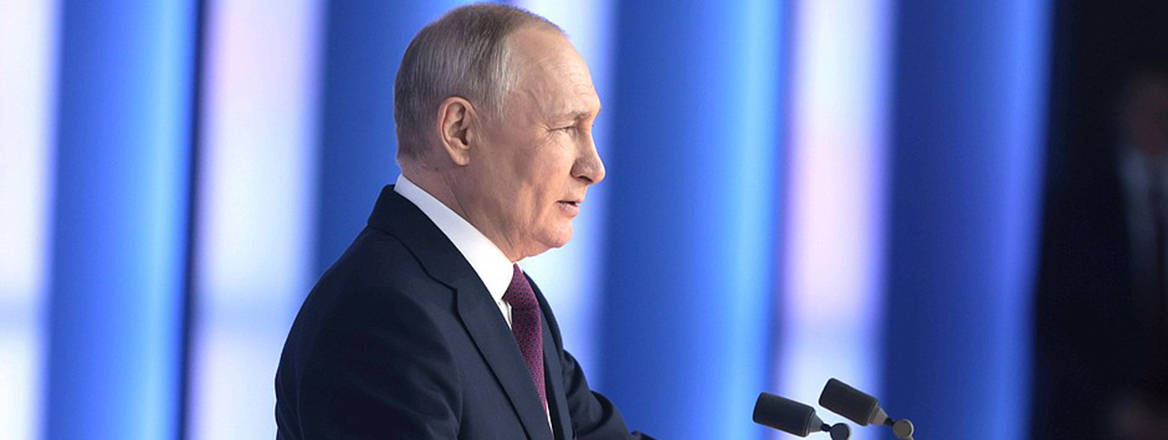Russia and Putin’s Latest Speech: A Series of Unfortunate Events
Doubling down on past errors seems to be the Russian leader’s only constant approach.
At first glance, President Vladimir Putin’s address to the nation on 21 February seemed to run the traditional gamut of anti-Western sentiment, conspiracy theories and revisionist versions of Russian history. But this year, it was not so much the content but the choreography of the speech that was most notable.
Due to the speech’s proximity to the first anniversary of Russia’s full-scale invasion of Ukraine on 24 February 2022, observers may have been forgiven for hoping for new revelations about the war from Putin – announcements of a new offensive, changes to language about the ‘special operation’ that would signify escalation or de-escalation, or specifics about winning the war in Ukraine. But most were left disappointed, as the speech contained no clarifications about Russia’s concrete goals on the ground in Ukraine, or what success might look like.
The most salient point was Putin’s unexpected announcement that Russia would be suspending its participation in New Strategic Arms Reduction Treaty (New START), the last remaining nuclear arms control treaty with the US. But events transpiring around the speech make clear that this announcement was likely a reactive and unscheduled development for Putin too, and that despite the war, Russia is still paying close attention to its broader foreign policy.
Distraction from the Bigger Picture
For the sake of clarity, it is worth tracking the timeline of events around Putin’s speech, as numerous moving parts led to unexpected decisions.
First, US President Joe Biden announced on 20 February that he would be conducting a surprise visit to Kyiv, in a show of support for President Volodymyr Zelensky, while also pledging $500 million in military aid. Officials claim that Biden informed Russia of the trip a few hours before he arrived for deconfliction purposes – the Kremlin has not officially commented, but state television channels incorporated the visit into now commonplace narratives that the US is controlling events in the war, and Zelensky himself.
Although Putin’s speech was mostly focused on domestic policy, the foreign policy agenda seems to have taken over
The next day, parts of Putin’s speech on 21 February were likely hastily edited in response to the visit, and it ultimately read rather clumsily. Almost at very end of the speech, a discussion about the urgency of passing laws on tourism and waste management systems abruptly shifted to several paragraphs about how the US and NATO are attempting to use the war as a means to inflict ‘strategic defeat’ upon Russia, culminating in the announcement about Russia’s suspended participation in the Treaty.
The day after Putin’s speech, on 22 February, the upper and lower chambers of the Russian parliament held meetings that were only scheduled recently. A few weeks beforehand, several Duma members in statements to the press claimed that the topic under discussion would be Russia’s annexed regions of Ukraine, particularly the allocation of state funding – the Treasury is thought to have apportioned more than 250 billion rubles for reconstruction and development there. Instead, in the 22 February meeting, both chambers discussed and approved the suspension of New START, as announced by Putin the day before. The delay is unlikely to have a material effect on integration; Russia is thinking long-term about these territories, with the official planning period for their integration into Russian financial and political departments scheduled for January 2026.
Although Putin’s speech was mostly focused on domestic policy, the foreign policy agenda seems to have taken over. The suspension of New START indicates that Putin felt the need to respond to Biden’s visit, balancing between turning anti-Western rhetoric into action and not escalating matters in eastern Ukraine, for which there is little appetite within Russia. This epitomises one of the many dilemmas that Putin is caught in – emphasising the West’s declining power and influence (as juxtaposed with Russia’s rise), while responding directly to decisions that the White House takes. Putin’s instruction to the Ministry of Defence and Rosatom to prepare to conduct nuclear tests – but only if the US begins to conduct nuclear tests first – highlighted this preoccupation, while also framing any future escalation in the nuclear dimension as the fault of the US.
Friends Abroad
The speech may have emphasised Russia’s turn away from the West, but concurrent events suggest that Russia is still investing in its other long-term foreign policy relationships.
On the same day as Putin’s speech, it was announced that China’s President Xi Jinping would travel to Moscow for a summit with Putin in the next few months. There, Xi is expected to reiterate calls not to use nuclear weapons. China has sought to present itself as a mediator in Russia’s war, and while it lacks international credibility – or trust and interest from Russia’s side – Xi’s concerns about the ratcheting up of tensions over the war have been noted and heard in Moscow. China’s expression of concerns about the nuclear dimension have in previous months been sufficient to alter Putin’s rhetoric on the potential use of nuclear force.
While the war in Ukraine is entering its second year and absorbing significant resources, it is clear that Russia still has room for long-term strategic planning
Even as Russia’s invasion of Ukraine marks its grim second anniversary, Russia, China and South Africa are conducting much-criticised trilateral naval exercises off the coast of South Africa, until 27 February. Overlapping with the anniversary of the war, the exercises are taking place around the port of Durban and Richard Bay – strategically important shipping routes that link up Europe and Asia. This is less about trade – Russia and South Africa have little turnover and imports are chiefly from China – and more about aligning national interests to act as a counterweight to the US-led world order. The timing is a clear signal that there are countries for whom Russia’s war does not present a barrier to cooperation, as long as it chimes with their national interests.
Russia’s Foreign Minister Sergei Lavrov has also just returned from another trip to Africa, his second since the war began, to coincide with the start of the naval exercises. Although the economic relationship between Russia and African countries remains relatively piecemeal and small-scale, there still appear to be many states on the continent prepared to embrace or at least ignore the most challenging aspects of Russia’s view of the world. The Russia-Africa Summit will be held in St Petersburg later this year: established in 2019, since Russia invaded Ukraine the Summit has taken on a new urgency, with Russia keen to identify new clients for its exports. Lavrov has been open about the fact that much of the conference will identify ways for Russia and Africa to manoeuvre around the US sanctions, including moving to using national currencies rather than the US dollar.
Russia and the US also appear to be engaging in a somewhat tit-for-tat battle for control of the narrative in Africa. Biden toured Africa in December, and US Treasury Secretary Janet Yellen in mid-January conducted a series of engagements across the continent. Lavrov’s second trip might have been a direct response to Yellen’s visit – in a January press conference Lavrov failed to mention his upcoming trip, suggesting it might have been more hastily arranged.
Ultimately, although Putin’s speech offered few new insights about Ukraine itself, events around the speech indicate his priorities for Russia’s foreign policy. While the war in Ukraine is entering its second year and absorbing significant resources, it is clear that Russia still has room for long-term strategic planning.
The views expressed in this Commentary are the author’s, and do not represent those of RUSI or any other institution.
Have an idea for a Commentary you’d like to write for us? Send a short pitch to commentaries@rusi.org and we’ll get back to you if it fits into our research interests. Full guidelines for contributors can be found here.
WRITTEN BY
Emily Ferris
RUSI Senior Associate Fellow, International Security
- Jim McLeanMedia Relations Manager+44 (0)7917 373 069JimMc@rusi.org


